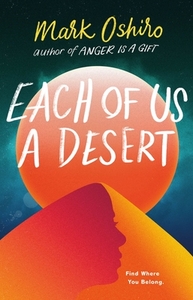Take a photo of a barcode or cover
This book reminds me of the novella The Deep - without quite so much weight - with one girl burdened with the stories of everyone she meets, while they get to forget and move on. But Xochitl gets to grow, shedding her naivete and the traditions of her people (things she thought were hard and fast rules) as she sets off on what is, at its core, a bit of a selfish quest.
But her relationship with Emilia - enemies to grudging allies to friends to ride-or-die to something that really could be lovers - is really the center of this story. As each side character comes and goes, we see Xochitl and Emilia adapt to each situation, communicate, confront it.
Not to mention that the prose is poetic, seamlessly blending the Spanish conversation and terms into the English narrative (with translations that don't feel clunky). Oshiro brilliantly shows the vast and unforgivable desert and how each person (each a desert of their own, which is also pieced together by the end) fits.
The last hour or so of the audiobook was a little repetitive but it felt in line with Xochitl's mental and emotional state. I blame myself for kind of wanting to rush through it. It also took a while for the real plot to kick off, for Xochitl and Emilia to come together. But looking back, I suppose that felt right, too.
{Thank you Macmillan Audio for the ALC; all thoughts are my own}
But her relationship with Emilia - enemies to grudging allies to friends to ride-or-die to something that really could be lovers - is really the center of this story. As each side character comes and goes, we see Xochitl and Emilia adapt to each situation, communicate, confront it.
Not to mention that the prose is poetic, seamlessly blending the Spanish conversation and terms into the English narrative (with translations that don't feel clunky). Oshiro brilliantly shows the vast and unforgivable desert and how each person (each a desert of their own, which is also pieced together by the end) fits.
The last hour or so of the audiobook was a little repetitive but it felt in line with Xochitl's mental and emotional state. I blame myself for kind of wanting to rush through it. It also took a while for the real plot to kick off, for Xochitl and Emilia to come together. But looking back, I suppose that felt right, too.
{Thank you Macmillan Audio for the ALC; all thoughts are my own}
adventurous
reflective
slow-paced
As a therapist and therefore kinda cuentista-adjacent, i was really invested in trying to unravel the whole cuento/story/truth knot. I may have ended up focusing on the wrong parts of the knot, but the beats of the story kinda passed me by and by the end I wasn’t very invested in the resolution.
Another reason I potentially was just trying to cross the finish line w this book instead of actually diving in was the pacing. It felt like we got a LOT of lore, romance, character building, stakes etc in act 3 that I wish could have come earlier (potentially in lieu of Jesus god all that walking).
Also, I desperately wanted to know the lore of this world. Is it a post nuclear apocalypse? Is that why, Xochitl’s journey is South->North but when plotted on a map that same journey is North->South? Did the magnetic poles flip? What was the deal with that one cuentista from… Oregon? California? If it’s nuclear, why are there magic therapists and psychic animals? The ones of the pale vestments—are they white people (green eyes and pale skin)????? Did they burn in the sun bc the sun is stronger due to a nuclear-explosion-destroyed ozone layer? More importantly is there a race metaphor aspect to this??? Why were they making evil guardians??
I don’t want a sequel, I guess I just wanted a book that focused on different parts of its subject. I could see this book resonating with others, but it’s just not for me.
Another reason I potentially was just trying to cross the finish line w this book instead of actually diving in was the pacing. It felt like we got a LOT of lore, romance, character building, stakes etc in act 3 that I wish could have come earlier (potentially in lieu of Jesus god all that walking).
Also, I desperately wanted to know the lore of this world. Is it a post nuclear apocalypse? Is that why, Xochitl’s journey is South->North but when plotted on a map that same journey is North->South? Did the magnetic poles flip? What was the deal with that one cuentista from… Oregon? California? If it’s nuclear, why are there magic therapists and psychic animals? The ones of the pale vestments—are they white people (green eyes and pale skin)????? Did they burn in the sun bc the sun is stronger due to a nuclear-explosion-destroyed ozone layer? More importantly is there a race metaphor aspect to this??? Why were they making evil guardians??
I don’t want a sequel, I guess I just wanted a book that focused on different parts of its subject. I could see this book resonating with others, but it’s just not for me.
emotional
reflective
medium-paced
Strong character development:
Yes
Loveable characters:
Yes
Diverse cast of characters:
Yes
adventurous
emotional
hopeful
reflective
medium-paced
Plot or Character Driven:
A mix
Strong character development:
Yes
Loveable characters:
Complicated
Diverse cast of characters:
Yes
Flaws of characters a main focus:
Complicated
adventurous
challenging
emotional
reflective
tense
medium-paced
Plot or Character Driven:
Character
Strong character development:
Yes
Loveable characters:
Yes
Diverse cast of characters:
Yes
Flaws of characters a main focus:
Yes
reflective
slow-paced
Written as a single poem uttered by the storyteller Xochital, Each of Us a Desert by Mark Oshiro was a book I wanted to take my time with. Xochital is the storyteller for her village. She takes the confessions of her neighbors and returns them to Solis and forgets them. It is a life, though not one that she chose for herself. She found poems in the desert, and these poems keep her going. Then she takes a story that changes the way she sees everything—her village and other villagers. Xo begins a journey to have someone take her power away so she will no longer have to accept stories. Along the way, she is joined by Emilia, the daughter of the town’s horrible mayor.
There isn’t much I don’t love about this book. The setting is breathtaking, the writing poetic. With the exception of Julio, characters were well-developed. My favorite aspect of the story was the Spanish words and phrases used throughout. I was glad I read it digitally because it made it easy to look up words I didn’t know.
Thank you to Tor Teens and NetGalley for the digital ARC.
There isn’t much I don’t love about this book. The setting is breathtaking, the writing poetic. With the exception of Julio, characters were well-developed. My favorite aspect of the story was the Spanish words and phrases used throughout. I was glad I read it digitally because it made it easy to look up words I didn’t know.
Thank you to Tor Teens and NetGalley for the digital ARC.
In a post-apocalyptic Central American society, 16-year-old Xochitl has already served as the 'cuentista' of her village for half of her life. Dutifully, she listens to the most sordid of confessions, absorbing sin and shame into her own mind and body, before offering them up to the sun God Solis to be cleansed. Even though she forgets each confession as soon as she passes it on, it is a painful and emotionally draining process that has left her wise beyond her years – and exhausted on a spiritual level.
She longs for a life beyond her role, fearing to lose her own true self completely if she continues to let herself be used as a vessel for guilt and shame not her own. She flees into the harsh desert, finding an unlikely companion in Emilia, the daughter of a brutal conqueror who has been plaguing the village with unspeakable acts of cruelty.
While post-apocalyptic settings are common in YA literature, Mark Oshiro has crafted a world unlike anything I've read before. With depth and authenticity, he incorporates Latinx culture and themes of identity, community, faith, and self-discovery. This is a book that needs to be read with patience and an open mind, but it is so beautiful – and captivating in its own way.
Introspective and slow-paced, the story focuses on the emotional journey of the characters rather than traditional suspense or action. Though the stakes are high, the author never rushes the personal growth of his protagonists. Their inner conflicts are not always spelled out, but you can feel the raw hurt behind them, and the faintest glimmer of hope.
Xochitl's relationship with Emilia evolves throughout the journey, and their slow-burning romance is handled with a delicate touch.
The writing is gorgeous, with a quiet, lyrical prose that never feels pretentious. The incorporation of Spanish phrases might be challenging for non-Spanish readers, but it adds authenticity to the world-building.
Towards the end, I felt like the story faltered and lost some of its focus. But all in all, »Each of Us a Desert« is a thought-provoking and intense read that lingers with the reader for a long time.
She longs for a life beyond her role, fearing to lose her own true self completely if she continues to let herself be used as a vessel for guilt and shame not her own. She flees into the harsh desert, finding an unlikely companion in Emilia, the daughter of a brutal conqueror who has been plaguing the village with unspeakable acts of cruelty.
While post-apocalyptic settings are common in YA literature, Mark Oshiro has crafted a world unlike anything I've read before. With depth and authenticity, he incorporates Latinx culture and themes of identity, community, faith, and self-discovery. This is a book that needs to be read with patience and an open mind, but it is so beautiful – and captivating in its own way.
Introspective and slow-paced, the story focuses on the emotional journey of the characters rather than traditional suspense or action. Though the stakes are high, the author never rushes the personal growth of his protagonists. Their inner conflicts are not always spelled out, but you can feel the raw hurt behind them, and the faintest glimmer of hope.
Xochitl's relationship with Emilia evolves throughout the journey, and their slow-burning romance is handled with a delicate touch.
The writing is gorgeous, with a quiet, lyrical prose that never feels pretentious. The incorporation of Spanish phrases might be challenging for non-Spanish readers, but it adds authenticity to the world-building.
Towards the end, I felt like the story faltered and lost some of its focus. But all in all, »Each of Us a Desert« is a thought-provoking and intense read that lingers with the reader for a long time.
adventurous
dark
emotional
mysterious
tense
medium-paced
Plot or Character Driven:
A mix
Strong character development:
Yes
Loveable characters:
Yes
Diverse cast of characters:
Yes
Flaws of characters a main focus:
Yes
This book had me in a chokehold from the start. I don't speak any Spanish and when I realised there were a lot of Spanish words and phrases my first thought was "oh no" but in the end I really liked the effect. I only looked up a couple of words/phrases and maybe I've misinterpreted some words but I think I got most of them from context.
It didn't read YA to me at all (which is a good thing in my book). I'm not usually one for horror but it worked here.
I'm amazed by how vividly I could imagine the punishing heat, thirst, physical exhaustion etc.
Ugh, just read it. It's good. I'm gonna reread it for sure.
It didn't read YA to me at all (which is a good thing in my book). I'm not usually one for horror but it worked here.
I'm amazed by how vividly I could imagine the punishing heat, thirst, physical exhaustion etc.
Ugh, just read it. It's good. I'm gonna reread it for sure.
Graphic: Body horror





